Research
Sociologist advocates for transformation through humanising black people
If you simply look up the meaning of the word transformation, it means change. But if you theorise about it, it is particular. At Unisa, some of the central theories used for thinking about transformation are decoloniality, Africanisation and diversity.
At the forefront of facilitating and leading transformation and change at Unisa is sociologist Prof Grace Khunou, the acting Executive Director of the Department of Leadership and Transformation (DLT).
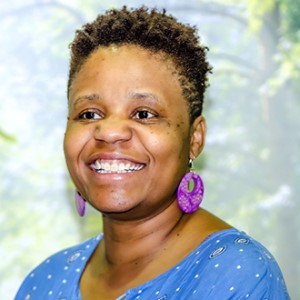
Prof Grace Khunou
With most of her research work influenced by her PhD study, Maintenance and changing masculinities as sources of gender conflict in contemporary Johannesburg, Khunou has since been unapologetic about the transformation agenda in academia and society.
Khunou also does research on class and intimacy, which centers the idea that black people are not one thing and one thing only: "Black people are heterogeneous; and experience socioeconomic conditions differently. That is why I study the black middle class to illustrate that black people are not only experiencing poverty. They are experiencing other things, and my study seeks to demonstrate those characteristics," she explained.
Continuing, Khunou says that her research goal is to look at black people anew with the intention of humanising them by using historical African ways of knowing, "to re-imagining who we are and how we want to be experienced in the world," she adds.
Some of Khunou’s studies post her PhD, sought to fill in the gaps or address new key questions that came up from her PhD turned into a book, Love in Jozi: The Black Middle Class, Love and Intimacy in Johannesburg, recently published by UJ Press and is already showing promise as key on understanding blackness, middle class position and intimacy. She adds that this project was inspired by one of the findings from her PhD on money and how it influences intimate relationships. "Most of the people that I interviewed for my PhD were in the working class and so I was curious to know how the same issues might be affecting the middle class and how do they experience it," she explained.
Her experiences of the university environment as a black female student and later as an academic, shaped her career trajectory and interest in transformation work. "I was also experiencing some of those challenges while advocating for and driven by social justice," says Khunou.
In her mission to establish a sense of belonging for black academics in the South African university sector, Khunou, together with other academics edited a volume titled Black Academics: The South African Experience. The book reveals personal experiences of black academics at South African universities in the context of the ongoing conversation on transformation and decolonisation in higher education.
In service of humanity
Khunou joined Unisa in 2021 as the director for Scholarship Change and later had a secondment opportunity as the director for Communication, Marketing and Events (CME) at Unisa’s Department of Institutional Advancement.
"Taking the time to go to the CME was a great opportunity for me to get a sense of what the institution looks like, what are its strengths, challenges and institutional cultures and how to navigate Unisa from a transformation perspective," reflects Khunou.
In the DTL, Khunou led a team to host three transformation conferences, which have been pivotal in grounding conversations around transformation, while serving as platforms to network with different stakeholders at Unisa. "In addition," she adds, "it showcases the work that people are doing on transformation at the university and throughout the sector, and furthermore, it sparks conversations around how to tackle some of the new issues arising, and on how to ensure that several of the historical goals around transforming the higher education sector are achieved."
Among the transformation events convened by DTL, one resulted in a published book edited by Khunou, titled Transforming higher education scholarship after COVID-19 and in the context of the 4th Industrial Revolution, launched in February 2025. "The book makes a case that transformation of higher education scholarship cannot happen without making space for historically excluded knowers, thinking differently about historically marginalised knowledges and by constantly grappling with new developments and how they facilitate or encumber the transformation project," said Khunou.
While her primary tasks are to monitor, evaluate and inspire transformation within the university, both from a scholarship and administrative perspective, she strongly advocates for mentoring other women to reach their greatest potential.
In pursuit of empowering professional black women researchers with PhDs, Khunou, in collaboration with Amisha Benode, the Programmes and Projects Officer for the Professional Research Committee (PRC) and Professional Research Group (PRG), established the Black Women in Administration Research Support Programme.
To foster professional development and academic growth, the PRG office identified female support staff with doctoral degrees, allowing Khunou to mentor and guide them in becoming NRF-rated researchers. In addition, this initiative helps researchers to develop their skills in supervising master's and doctoral students, as well as enhancing their own research outputs through publication support. "We have been running amazing workshops with research active women in administration with the objective of them becoming research leaders in their respective research areas," said Khunou.
Through collaboration and strategic mentorship, Khunou, in partnership with PRC, is paving the way for black women scholars to thrive in academia and make meaningful contributions to research.
Leading by example
To inspire black women to take up opportunities that they were previously marginalised from, Khunou says she had to take the lead, among the firsts, adding: "Look at Unisa’s executive management for instance, we currently have the first black woman Principal and Vice-Chancellor." Continuing, Khunou says that if LenkaBula had not raised her hand to stand up for this role, "we would not have had a black woman in this job. A lot of young black women would not have been inspired to think they can be vice-chancellors or whatever they might want to be, previously thought to be impossible given the background of our country," she explained.
Application for an NFR rating
Khunou says that the first time she applied for an NRF rating, was to change the narrative and to ensure that the numbers also reflect black women because, she sates: "Words alone are not enough, we therefore need to translate our discussions into action. I applied for an NRF rating because I love research, and I want to be able to have the resources that I need to continue delving deeper into research on transformation. Being rated opens opportunities to access research resources and partnerships."
Currently, Khunou has been NRF rerated with a C2, recognising her as an established researcher with a sustained recent record of productivity in her field by her peers.
The PRC in the Directorate of Research Support played a vital role in supporting Khunou towards securing the NRF rating. Through the office of the PRG, she received expert guidance to assist with the application process.
Concluding, Khunou stated: "When you work alone, it will take you longer but when you work with others, you go far."
* By Mpho Moloele, PR and Communications, Department of Research, Innovation and Commercialisation
Publish date: 2025-04-02 00:00:00.0


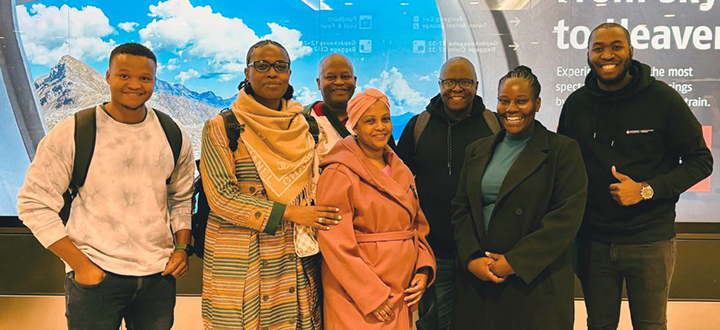 Unisa innovators making global waves in Switzerland
Unisa innovators making global waves in Switzerland
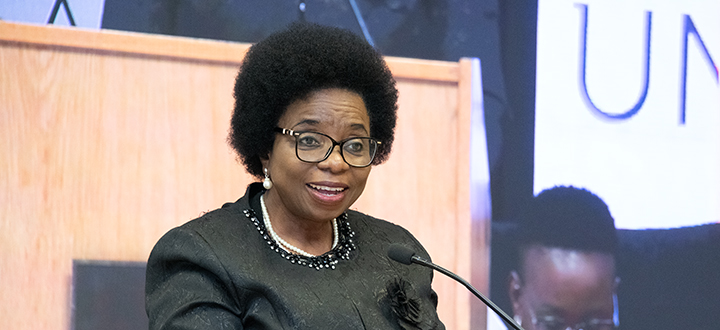 Future-proofing students for the coming digital wave
Future-proofing students for the coming digital wave
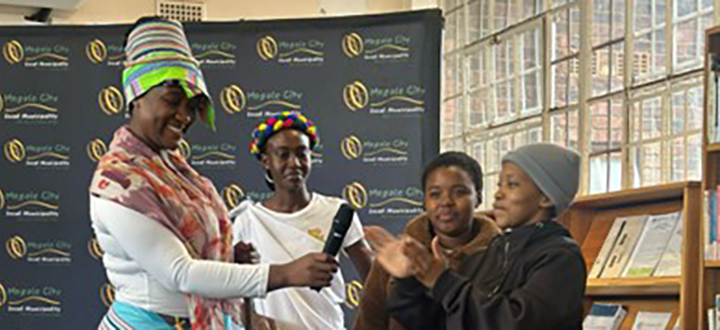 Unisa Library and Mogale City celebrate World Book and Copyright Day
Unisa Library and Mogale City celebrate World Book and Copyright Day
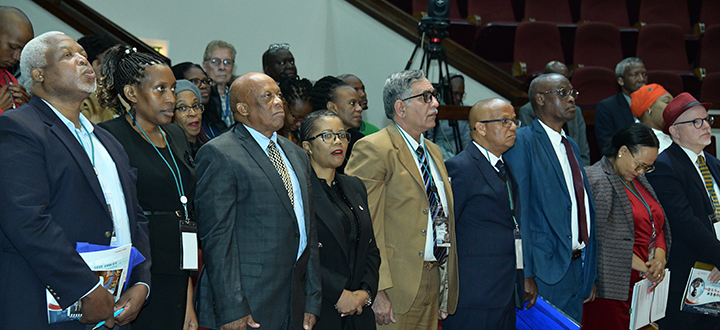 Groundbreaking Unisa conference examines how to connect minds and bridge gaps
Groundbreaking Unisa conference examines how to connect minds and bridge gaps
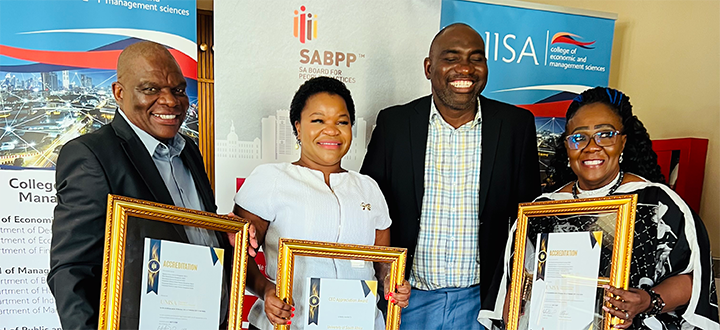 Unisan honoured with ultimate HR accolade
Unisan honoured with ultimate HR accolade